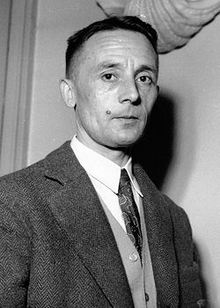Julien Gracq facts for kids
Quick facts for kids
Julien Gracq
|
|
|---|---|

Gracq in 1951
|
|
| Born | 27 July 1910 Saint-Florent-le-Vieil, Maine-et-Loire, France |
| Died | 22 December 2007 (aged 97) Angers, France |
| Occupation | Novelist, critic, playwright, poet |
| Nationality | French |
| Education | University of Paris |
| Period | 1938–2002 |
| Signature | |
 |
|
Julien Gracq (born Louis Poirier) was an important French writer. He was born on July 27, 1910, in a town called Saint-Florent-le-Vieil, France. He wrote many different types of books, including novels, plays, and poetry. His writing was special because it often felt like a dream. He used a very elegant style and a rich vocabulary. He was also connected to the Surrealist movement, especially its leader, André Breton. Gracq passed away on December 22, 2007, at the age of 97.
Contents
Life and Career of Julien Gracq
Early Education and Influences
Julien Gracq began his studies in Paris. He attended the Lycée Henri IV, which is a famous high school. After that, he went to the École Normale Supérieure in 1930. This was a very selective school for future teachers and researchers. He also studied at École libre des sciences politiques (Sciences Po), which is known for political studies. Both of these schools were part of the University of Paris at the time.
In 1932, Gracq read a book called Nadja by André Breton. This book had a big impact on him. Breton was a key figure in the Surrealist movement. Surrealism was an art and literature movement that explored dreams and the imagination. Gracq's first novel, The Castle of Argol, was even dedicated to André Breton.
Political Views and War Experience
In 1936, Gracq joined the French Communist Party. However, he left the party in 1939. This was after a political agreement called the Molotov–Ribbentrop Pact was signed.
During World War II, Gracq became a prisoner of war. He was held in Silesia with other French Army officers. There, he became friends with another writer, Armand Hoog. Hoog later described Gracq as a very independent person. He was also strongly against the Vichy government that ruled parts of France during the war.
Refusing the Prix Goncourt
In 1950, Gracq wrote a strong article. It was called La Littérature à l'estomac (which means "Literature in the Stomach"). In this article, he criticized modern literature and literary prizes.
The very next year, he won the Prix Goncourt. This is one of France's most important literary awards. He won it for his novel The Opposing Shore (Le Rivage des Syrtes). But, staying true to his beliefs, he refused to accept the prize.
Teaching and Later Life
Julien Gracq worked as a history and geography teacher. He taught in secondary schools (high schools) until he retired in 1970.
He preferred to stay away from major literary events. He remained loyal to his first publisher, José Corti. Gracq lived a quiet life in his hometown of Saint-Florent-le-Vieil. This town is located on the banks of the Loire River.
On December 22, 2007, Julien Gracq passed away. He died in a hospital in Angers, France, at the age of 97.
The Opposing Shore: A Famous Novel
What is The Opposing Shore About?
The Opposing Shore (Le Rivage des Syrtes), published in 1951, is Julien Gracq's most famous novel. It is a story about waiting.
The novel takes place in an old fortress. This fortress is near a sea that marks the border between two places: Orsenna and Farghestan. Orsenna is a quiet, old principality. Farghestan is its mysterious enemy. The characters in the story are stuck in a neutral zone. They are waiting for something to happen. They wonder if they should do something to cause change. This is especially true when change might mean the end of their civilizations.
Works by Julien Gracq
- Au château d'Argol, 1938 (novel) (English title: The Castle of Argol)
- Un beau ténébreux, 1945 (novel) (English title: A Dark Stranger)
- Liberté grande, 1947 (poetry)
- Le Roi pêcheur, 1948 (play)
- André Breton, quelques aspects de l'écrivain, 1948 (critique)
- La Littérature à l'estomac, 1949
- Le Rivage des Syrtes, 1951 (novel) (English title: The Opposing Shore)
- Prose pour l'Etrangère, 1952
- Penthésilée, 1954 (play; translation of Kleist's Penthesilea)
- Un balcon en forêt, 1958 (novel) (English title: A Balcony in the Forest)
- Préférences, 1961
- Lettrines, 1967
- La Presqu'île, 1970
- Le Roi Cophetua, 1970 (novel) (English title: King Cophetua); this book inspired the film Rendezvous at Bray
- Lettrines II, 1974
- Les Eaux Etroites, 1976 (English title: The Narrow Waters)
- En lisant en écrivant, 1980 (English title: Reading Writing)
- La Forme d'une ville, 1985 (English title: The Shape of a City)
- Autour des sept collines, 1988
- Carnets du grand chemin, 1992
- Entretiens, 2002
See also
 In Spanish: Julien Gracq para niños
In Spanish: Julien Gracq para niños
 | Toni Morrison |
 | Barack Obama |
 | Martin Luther King Jr. |
 | Ralph Bunche |

